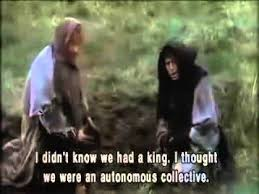For the purpose of this answer I am going to assume that you are not interested in the quite likely scenario that the king of the respective realm would simply grant the lands to other lords adjacent to the lands in question, but in the scenario of sudden and long lasting anarchy in a medieval setting.
The answer is, that you would basically rewind the social clock for some time, until it sooner or later reverts to its former state.
Humans are pack animals, our natural state of society is tribalism. Medieval peasants essentially lived in communities consisting of extended families. The loss of the central authority means that they all are now essentially tribal once more. There wouldn't be a sudden breakdown of public order because their communal structures are already in a self sufficient and natural social state.
So for a time things would improve for them: No longer do they have to provide labor for their lord; they can completely focus on themselves. No longer are there laws which forbid them to hunt wildlife or regulate their interaction with natural resources provided by forests and rivers. Life is good.
After some time however, certain problems will arise:
The peasant communities have enjoyed their newwon freedoms, cultivated their lands and did, what humans like to do most, namely procreate.
Young men are growing up and reach the age, at which they can start families of their own.
Before the griffin, most of them would have had to assist their father or their oldest brother as farmhands, ask the local lord for permission to marry a woman and hope that they are allocated a piece of land for them to cultivate on their own; otherwise they would have had to stay farmhands or ask for permission to go elsewhere.
Now, however, things are different. There is no longer a lord which is responsible for allocating the available land and enforcing the current allocation.
So the men happily stride out into every direction looking for new land to settle on... of which there is only a limited amount, if any. You can guess now in which direction we are going...
While the tribal structures, the peasants are living in, are most likely peaceful and stable INTERNALLY, their interaction with other tribes is not. At some point they will revert to what tribes have always done: warring with each other over resources.
The catalyst for the inevitable violence to come can be several things...
As mentioned before, maybe there are simply too many men who want their own land to cultivate...
Maybe there is local drought, flood or other natural disaster, which ruins the harvest for some communities. Without a lord to enforce the redistribution of food to the communities in distress and with other communities unwilling to share, things are bound to spiral downwards...
Maybe some communities resent being stuck with the more barren land and decide that things can only get better by taking someone else's land.
The possibilities are endless.
Basically, over time you will see history repeat itself: Tribes fight each other. Multiple tribes form clans to increase their power. Out of necessity they start allocating resources to a permanent warrior class, which is responsible for protecting their lands and conquering new ones.
The now extant warlords plot against and battle each other until one of them manages to subjugate all the others, at which point he decides to put on a fancy hat and grants himself a nice title. If only he hadn't forgotten about the griffin that doesn't like fancy hats and nice titles...

